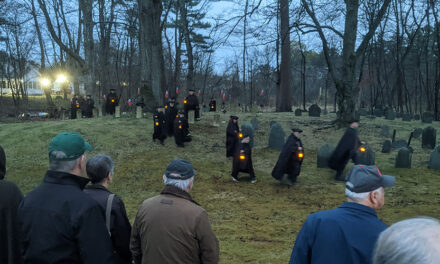Published in the August 15, 2018 edition
By JILLIAN STRING
LYNNFIELD — The three-and-a-half hour Zoning Board of Appeals (ZBA) meeting on August 7 was devoted entirely to a discussion regarding Boston Clear Water Company, 165 Lowell St.
The hearing was carried over from the July 10 meeting, and will continue into the September 11 meeting as well.
The petitioners, Mary Bliss, Andrew Gallucci, Willis O’Brien, and John Sievers, are seeking to appeal Building Inspector Jack Roberto’s decision regarding zoning violations allegedly committed by Boston Clear Water Company (BCWC), the owners of the property at 165 Lowell St.
Attorneys Brian McGrail and Julie Connolly, representing BCWC, presented their response to the claims of the petitioners presented at the July 10 meeting.
“The first (claim) is that there is insufficient evidence to establish a lawful preexisting nonconforming commercial use of the property,” said McGrail. “The second allegation is to the extent that a commercial activity was ever lawfully permitted on the property, said use was extended without relief from the board of appeals, and therefore is no longer protected as a lawful nonconforming use. The third allegation of the petitioners is to the extent the commercial activity was ever lawfully permitted upon the property, said use has been abandoned for a period in excess of two years and therefore, is not protected as a legal nonconforming use.”
According to McGrail, BCWC is not a party in this matter. McGrail and Connolly stated that they were only present to share evidence with the board, as the result of the hearing would directly impact BCWC.
McGrail argued that the petition should be procedurally barred, citing the doctrine of res judicata (a Latin term meaning “a matter judged”).
“The petitioners are precluded from bringing this appeal by the doctrine of res judicata,” McGrail stated. “The doctrine of res judicata precludes the relitigation of claims that were previously the subject of an adjudication when one, there was a final decision on the merits, two the party against whom the preclusion is asserted was a party in the prior proceeding, and three the claim or issue in the prior proceeding is identical to those in the current one.”
Both ZBA member Anthony Moccia and attorney for the petitioners Jason Kimball challenged this argument.
Because the petitioners withdrew their 2017 appeal, Moccia was unclear as to whether or not a final decision was ever rendered on the merits of the case, as required by the doctrine of res judicata.
“The previous zoning complaint to this board, Lynnfield Building Inspector, and subsequent petition to the zoning board case 17-14, did not contain any of the zoning complaints in this matter, case 18-14,” Kimball said. “The matters before the board tonight are unrelated to case 17-14, therefore, no judgement has been issued by this board on the zoning complaints associated with this case.”
Connolly presented a timeline of events, as well as affidavits from Lucy Marie Smith Vazzana (former owner of the property) and customers Robert Reed and Mary Cole, concerning the property in an effort to refute the claims made by the petitioners.
According to Connolly, even though Vazzana’s tenant, Don LeColst, said he was shutting down Pocahontas Spring Water, the property was never abandoned.
Kimball refuted this claim, stating that Vazzana, who has resided in North Carolina since 2006, had no way of knowing what was taking place at the property unless she returned to visit, which her affidavit does not indicate.
According to Kimball, Vazzana knew LeColst was ceasing operations in March 2012, and nothing was done with the property until June 2014 when it was sold to BCWC.
“Inaction is an action,” Kimball said, referring to Vazzana’s intent to abandon the property.
Due to time constraints, ZBA Chairman Brian Shaffer concluded the meeting and postponed further discussion until September 11.




